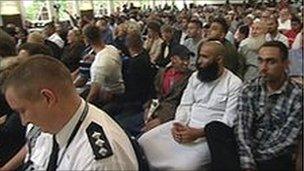Police remove 'spy' cameras from Birmingham
- Published
West Midlands Police said it has removed all covert "spy" cameras installed in areas of Birmingham with a large Muslim population.
More than 200 - covert and overt - were put up earlier this year, paid for with government money to tackle terrorism.
An independent report into their installation said public consultation was "too little and too late".
Chief Constable Chris Sims has apologised and said none of the cameras was ever used.
All overt cameras have also now been covered until after discussion with a new project board which has a "strong community representation".
Mr Sims said: "I am sorry that we got such an important issue so wrong and deeply sorry that it has had such a negative impact on our communities.
"No cameras associated with the project have ever been used."
The cameras were installed in the Washwood Heath and Sparkbrook districts and were put up by the Safer Birmingham Project (SBP), made up of the city council, police and other agencies.
They can record pictures and number plates of every car that goes in or out of the areas.
The £3.5m funding for the cameras came from the Terrorism and Allied Matters Fund.
At the time residents reacted angrily, claiming there had been no consultation.
Thames Valley Police was asked to conduct an independent review into their installation which was called Project Champion.
The report was carried out by Sara Thornton, a member of the team which provided the funding.

More than 300 people attended a public meeting in Bordesley Green during the summer
The report said a lack of transparency over their installation "significantly undermined" police trust and set back relations by almost 10 years.
The cameras were put up after "problems" surfaced in West Midlands Police surveillance-based investigations during in 2006, the report stated.
The report said overall West Midlands Police's handling of the scheme, showed "little evidence of thought being given to compliance with the legal or regulatory framework" before the cameras were put up.
The force has since acknowledged mistakes and held several public meetings with campaigners and residents angry at their installation.
The report said the idea of carrying out surveillance of suspected terrorists in a residential area should have been challenged.
"The very practical problem regarding the surveillance of suspected terrorists during CTU investigations was considered to have been addressed by establishing a permanent surveillance capability in a semi-residential area of predominantly Asian ethnic groups," the report said.
"This thinking should have been challenged by strong ethical and strategic leadership right from the start and questions should have been asked about its proportionality, legitimacy, authority necessity, and the ethical values inherent in the proposed course of action."
Steve Jolly, who has protested about the cameras, said the report showed the project was "ill thought-out".
"It's a frank admission that the whole thing was a disaster," he said.
"It confirms everything that myself and other opponents have been saying. The scheme was ill thought out and counter productive."
Following the publication of the police report, Mr Sims said he fully accepted its findings but added when the project started the security situation in the UK and Birmingham was "grave".
"I am convinced that when Project Champion was conceived in 2007 this dilemma was clearly understood, however somewhere between conception and delivery the critical balance was lost," he said.
"There were serious shortcomings shown by the West Midlands Police management of this project.
"This allowed the specification to move beyond the point where it was proportionate to the community safety risks and counter terrorism threats that it aimed to address.
"At the same time, the vital consultation that should have accompanied the scheme proved wholly inadequate."
- Published6 August 2010
- Published30 July 2010
- Published17 June 2010